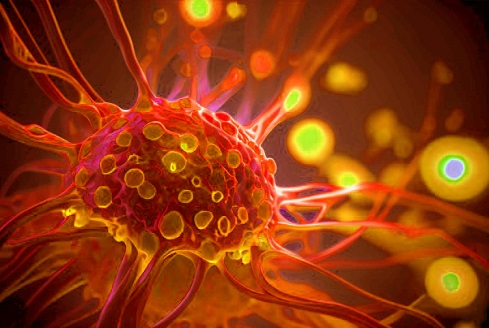Nikhil Prasad Fact checked by:Thailand Medical News Team Dec 26, 2024 3 months, 3 weeks, 4 days, 9 hours, 50 minutes ago
Medical News: Introduction to Breast Cancer and the Role of Glutamine
Breast cancer remains one of the leading causes of cancer-related deaths globally. Researchers are continuously seeking innovative treatment strategies to combat this devastating disease. A recent study has spotlighted an intriguing approach involving the inhibition of glutamine synthetase (GS) using amino acid analogs. This enzyme plays a critical role in cancer cell metabolism, aiding rapid proliferation. The study highlights two promising compounds - Acivicin and Azaserine - and their potential to revolutionize breast cancer therapy.
 Promising Advances in Breast Cancer Treatment Targeting Glutamine Metabolism
Promising Advances in Breast Cancer Treatment Targeting Glutamine Metabolism
Glutamine, a vital amino acid, is often described as the "fuel" for cancer cells. It supports their growth by supplying carbon and nitrogen, essential for DNA and RNA synthesis. This
Medical News report explores how targeting glutamine metabolism can be a game-changer in breast cancer treatment. Researchers from Menoufia University, Umm Al-Qura University, Cairo University, and other institutions collaborated to evaluate the therapeutic potential of these amino acid analogs.
Understanding the Study’s Framework
The study examined the effects of Acivicin and Azaserine on breast cancer cell lines, particularly MCF-7 cells. These were compared with non-tumorigenic MCF-10 epithelial cells to gauge specificity and safety. Unlike traditional drugs like Sorafenib, which often harm normal cells, these compounds displayed selective toxicity toward cancer cells.
The study details the innovative methodologies employed, including molecular docking studies and in vitro assays, to elucidate how these compounds interfere with GS activity. The findings emphasize the unique mechanisms through which these analogs disrupt cancer cell metabolism while sparing healthy cells.
Key Findings of the Research
-Selective Targeting of Cancer Cells
Both Acivicin and Azaserine effectively inhibited the growth of MCF-7 cells. At low concentrations, they demonstrated minimal impact on non-tumorigenic cells, highlighting their potential as safe therapeutic agents. Conversely, Sorafenib, a widely used cancer drug, caused significant damage to normal cells.
-Activation of Programmed Cell Death (PCD)
The study revealed that Acivicin and Azaserine induced apoptosis, or programmed cell death, in cancer cells. Using techniques such as Annexin-V assays and DAPI staining, researchers observed that Acivicin predominantly triggered early apoptosis, while Azaserine was more associated with late-stage apoptosis.
-Suppression of Glutamine Synthetase Activity
One of the most compelling findings was the marked reduction in GS expression at both RNA and protein levels in treated MCF-7 cells. By limiting intracellular glutamine production, these compounds effectively starved the cancer cells of a critical resource.
/>
-Modulation of Cytokine Production
Both compounds promoted the production of anti-inflammatory cytokines like IL-4 and IL-10 while reducing levels of pro-inflammatory markers such as TNF-α. This dual action not only inhibited cancer progression but also created a less hostile tumor microenvironment.
-Insights from Molecular Docking Studies
Bioinformatics tools confirmed that both Acivicin and Azaserine exhibit strong binding affinities to the GS enzyme. These interactions were more effective than those observed with standard inhibitors, suggesting that these compounds could serve as potent GS antagonists.
The Broader Implications of the Study
This research underscores a paradigm shift in cancer treatment by focusing on metabolic vulnerabilities of cancer cells. Unlike conventional therapies that indiscriminately target dividing cells, this approach hones in on a metabolic pathway crucial for cancer survival.
The implications extend beyond breast cancer. Given that glutamine metabolism is a hallmark of many tumor types, these findings could pave the way for similar therapies in other cancers, such as pancreatic or colorectal cancer.
Study Limitations and Future Directions
While the results are promising, there are several areas requiring further investigation:
-In Vivo Validation: The study’s findings were based on in vitro experiments. Future studies must evaluate these compounds in animal models to confirm their safety and efficacy.
-Combination Therapies: Exploring the synergistic effects of these compounds with existing chemotherapies could enhance treatment outcomes.
-Toxicity Profiling: Although Acivicin and Azaserine showed minimal toxicity to normal cells, comprehensive toxicity studies are essential for clinical translation.
Conclusion
The study provides robust evidence that Acivicin and Azaserine are promising candidates for targeted breast cancer therapy. By selectively inhibiting glutamine synthetase, these compounds disrupt the metabolic processes essential for cancer cell survival. Additionally, their ability to modulate cytokine production offers a dual benefit of combating cancer while mitigating inflammation.
Future research must focus on optimizing these compounds for clinical use, ensuring their effectiveness across diverse patient populations. This metabolic approach represents a significant step toward more personalized and less toxic cancer treatments.
The study findings were published in the peer-reviewed International Journal of Molecular Sciences.
https://www.mdpi.com/1422-0067/26/1/78
For the latest on Breast Cancer, keep on logging to Thailand
Medical News.
Read Also:
https://www.thailandmedical.news/news/singapore-study-finds-that-brief-exposures-to-magnetic-fields-can-enhance-uptake-of-breast-cancer-chemotherapeutic-drugs
https://www.thailandmedical.news/news/scientists-from-finland-discover-that-hpv16-e6-protein-plays-a-role-in-breast-cancer
https://www.thailandmedical.news/news/turkish-study-explores-possible-link-between-microbiota-and-breast-cancer
https://www.thailandmedical.news/news/breast-cancer-research-highlights-the-biphasic-effects-of-red-clover-extracts
